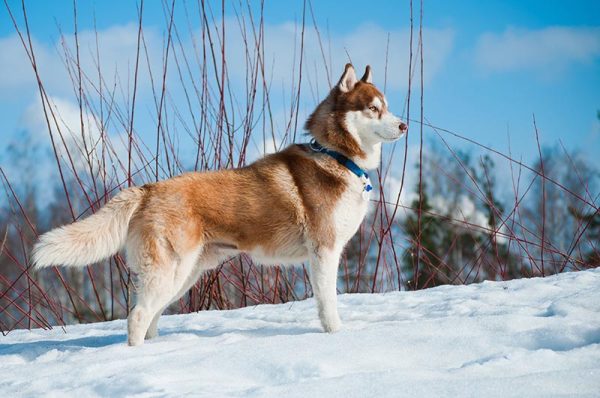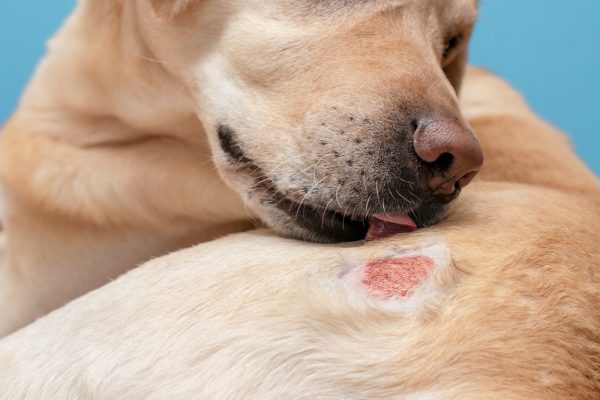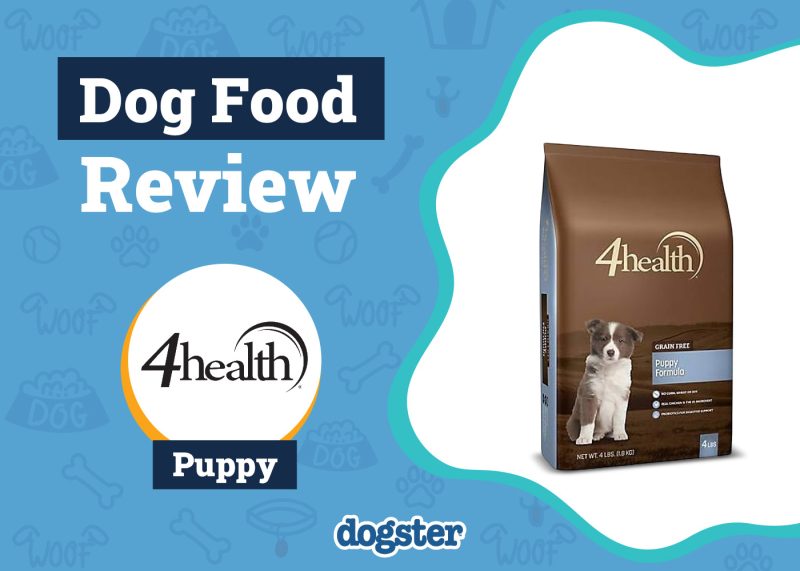In this article
View 4 More +While there is a great deal of information and hype in the human medical world on the topic of cannabidiol (CBD), veterinary medicine is in its infancy in understanding the potential medicinal effects of CBD. In addition, historically, some veterinarians may face legal and ethical obstacles in even being able to discuss this potential modality with their patient’s owners.
So, what’s a dog owner curious about CBD for their pup to do? In this article, we’ll explore more of what CBD is, as well as potential advantages, disadvantages, and safety considerations to contemplate as we aim to provide the best care possible for our canine companions.

What is CBD?
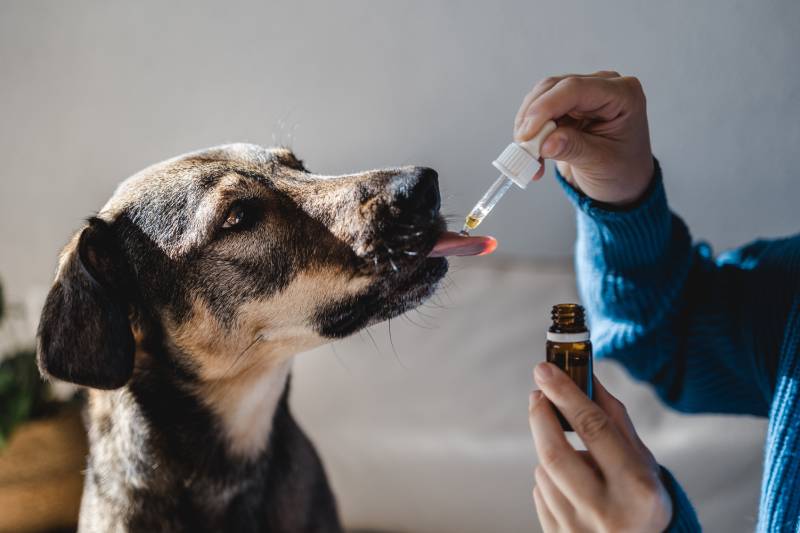
To find out what CBD oil is, we need to start back at the source of where CBD products come from.
The Cannabis sativa plant contains numerous chemical substances. Cannabinoids are the name for these chemical substances within the plant, of which there are over 100. One of the active compounds from the Cannabis plant is CBD, which stands for cannabidiol. Another well-known compound is delta-9-tetrahydrocannabinol (THC), which is the psychoactive ingredient in cannabis that can have intoxicating effects often described as giving a “high”.
The term “cannabis” can mean any of the products derived from this plant until it is further categorized based on the THC percentages of the substance, which can then be further categorized into marijuana or hemp.
According to the American Veterinary Medical Association (AVMA), marijuana has more than 0.3% dry weight of THC and in the United States is a Schedule 1 Drug regulated by the Drug Enforcement Administration (DEA). Again, per the AVMA, 0.3 % or less than dry weight of THC is classified as hemp; this product descheduled in 2018 under the Farm Bill.
Generally speaking, there is much more CBD compound in hemp plants and much more THC compound in marijuana plants. Much of the time, CBD itself is an oil that is extracted from hemp plants. This CBD oil can then be added to a myriad of products.
While there are some studies in the scientific literature for dogs regarding the use of CBD, they are limited, yet growing. However, extrapolation from the human world and anecdotal evidence, which is information based on personal observation, has become common as pet parents seek to apply these products to their dogs. As research on CBD continues to grow, it will help inform the veterinary profession as to more concrete treatment recommendations.
What is CBD Oil Used For?
CBD products, which encompass CBD oil, have been touted to have many potential uses. Some of these may include treatment for:
- Pain, including osteoarthritic pain
- Inflammation
- Anxiety
- Nausea
- Epilepsy
- Skin lesions or allergic skin disease
- Certain types of cancer
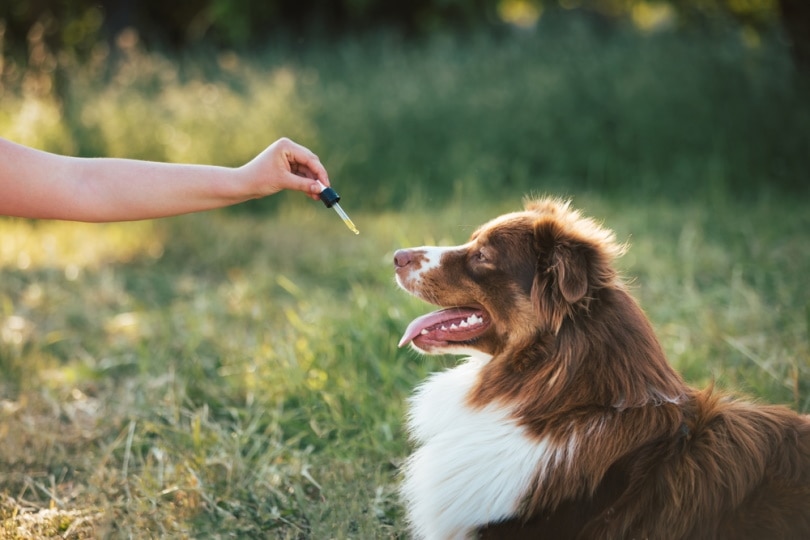
How is CBD Oil Given?
CBD can be available as an oil-based tincture, and in this form is typically sold in a medicinal bottle with a dropper (or syringe) to administer the product. Some instructions may suggest giving directly by mouth or adding the liquid from the dropper to the dog’s food or on/in a treat.
While CBD oil is a commonly available substance, there are also many other CBD-containing products available on the market. This may include CBD oral products like tablets/capsules, treats, and chews as well as topicals such as creams, balms, and sprays.
Potential Side Effects of CBD Oil
Some side effects that could occur with CBD products in general include:
- Increase in appetite
- Mild gastrointestinal upset such as vomiting or diarrhea
- Hypersalivation
- Sleepiness, sedation
- Potential for liver enzymes to be increased
- May affect or interact with certain types of other medications
- Long-term or other effects may not yet be known
Because CBD is non-psychotropic, it is thought that it may have “limited toxicity” (which is in contrast to THC). Overall, a quality product that is made well, tested appropriately, and properly dosed tends to be well tolerated.


Frequently Asked Questions (FAQ)
Can my dog get high from CBD oil?
No, this cannabinoid chemical by itself does not contain psychoactive compounds that would cause a dog to get high or have an effect of intoxication.
This is unlike another cannabinoid chemical, THC, which can produce a high and also has the potential for toxicity in dogs. But, if a CBD product does also contain THC, advertently or inadvertently, then there could be health concerns of intoxication. Additionally, because hemp can have as much as 0.3% THC, if a dog consumed a very large quantity of a hemp-CBD product relative to their size, there could theoretically be some effects.
What are some safety considerations to look for in selecting CBD oil or other products?
The first step is to acknowledge that CBD products are not currently regulated like how pharmaceuticals are, which may give some pause for concern. Additionally, quality control may be a potential problem. Just because a product says it does or doesn’t contain a certain amount of CBD does not actually make that so, and in fact, in some cases has been found not to be true!
Within this rugged landscape, it may be best to look for CBD marketed specifically for pets, and to select brands that are open about their policies for testing, procedures, and where they obtain their ingredients. A certificate of analysis (CoA) details how the manufacturer of the cannabis product measures their contents. In an ideal situation, this should come from an independent third party that also has a batch/lot-specific CoA.
Testing can be helpful to determine if the concentrated amount of CBD is correct as well as to determine if other cannabinoids such as THC or additional contaminants are present. In addition, choosing organically grown hemp that has had the CBD extracted via carbon dioxide is ideal and recommended.
Why can’t my veterinarian discuss CBD freely or recommend specific products?
Depending on where you live, federal, state, or other local laws may influence or limit what your veterinarian is legally able to discuss regarding CBD products. In the past veterinarians could be penalized for discussing CBD with a patient’s owner, but as time has gone on, more and more states are allowing veterinarians to discuss these products. Some areas may still have limits, as the laws do vary. In addition to the laws of where a veterinarian practices, their own personal risk assessment may also come into play as to how they choose to balance all of this information with their ability to provide medical care to their patients.
While there may be potential benefits from CBD products, more research, a clear regulatory process, safety data, and quality control are essential to providing the best information for veterinarians. As the science and the legal landscape continue to progress and change, there will continue to be more solid information to rely upon.
If you have any concerns about your dog or their health, the best resource you have is your vet.
If you need to speak with a vet but can't get to one, head over to PangoVet. It's our online service where you can talk to a vet online and get the advice you need for your dog — all at an affordable price!


Conclusion
While we’re still in the middle of the story of CBD for use in dogs, to this point, there are some purported potential medical benefits including pain and anxiety relief.
Because your veterinarian has your dog’s best interest at heart and knows their medical history, requesting a discussion with them before starting any CBD-related product for your dog is essential.
- You might also be interested in: The Brothers Apothecary Calming K-9 CBD Oil Review
Featured Image Credit: Nuva Frames, Shutterstock




